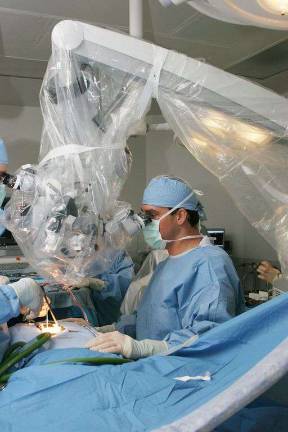Beyond the Brain: 5 Things Everyone Needs to Know About Neurosurgery Right Now

While news headlines about brain cancer and brain tumors affecting public figures – from Senator John McCain to TV host Maria Menounos – has sparked national conversation about neurosurgery, it's a topic many Americans know little about. Yet, it's critical to treating a variety of medical conditions, not just brain tumors. To advance public understanding and inform medical decision-making, Dr. Ronald Benitez, a board-certified neurosurgeon and president of Atlantic NeuroSurgical Specialists (ANS), shares fundamental insights about neurosurgery.
“In the U.S. alone, neurosurgeons perform more than 2 million procedures each year on the brain, spine and neurovascular system,” says Dr. Benitez. “Together, these make up the nervous system, the delicate and complex command, control and communication network in the body. No one should be left guessing when it comes to treating these critical areas of the body. Everyone should have at least a baseline education on neurosurgery before they or someone they love needs care.”
According to Dr. Benitez, here are the top five facts about neurosurgery everyone needs to know right now:
1. Neurosurgery is more than brain surgery.
While most people think neurosurgery is synonymous with brain surgery, it encompasses much more. Neurosurgery is short for neurological surgery, and it involves the diagnosis and treatment of disorders or injuries that affect any part of the nervous system, including the brain, spine, cervical spine (neck) and nerves throughout the body. Some of the most common conditions requiring neurosurgical care include brain tumors, aneurysms, stroke, concussions, pinched nerves, herniated and degenerative disks – as well as persistent neck or back pain that can be indicative of underlying issues.
2. Seeing a neurosurgeon may not entail surgery at all.
Seeing a neurosurgeon doesn't mean you're signing up to go under the knife. Neurosurgeons advise patients on how they can achieve the best medical outcomes, and oftentimes they result from alternate treatment methods such as pain management treatments or physical therapy.
3. Minimally invasive procedures are yielding positive outcomes.
When surgery is required, neurosurgeons are now using advanced, minimally invasive procedures whenever possible. Using small incisions, customized instruments and innovative imaging techniques, doctors can access and treat highly targeted areas of the brain, spine and neck, minimizing disruption to the surrounding tissues. This means less damage, less pain and shorter recovery times.
4. Selecting the right type of surgeon matters.
Neurosurgeons and orthopedic surgeons both treat many of the same body parts – primarily the neck and spine. However, orthopedic surgeons focus only on the musculoskeletal system – bones, muscles, joints and other connective tissue – and call in neurosurgeons when there is the possibility of nerve-related damage or complexity. When dealing with the central nervous system, consulting a neurosurgeon first can streamline care.
5. Acknowledging neurological warning signs can help defend your health.
As with any medical condition, acknowledging symptoms and quickly seeking care can help contain neurological damage and protect your health. Frequent extreme headaches, dizziness, blurred vision, prolonged neck and back pain are just some of the common symptoms that may indicate the need for a prompt neurosurgical consult.
For more information and educational resources on neurosurgery, contact Atlantic NeuroSurgical Specialists (ANS) – New Jersey's largest neurosurgical practice and one of the most advanced in the country – at 973.285.7800 and visit ansdocs.com.